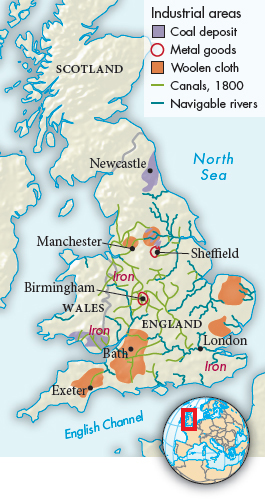Why Britain?
Why did the Industrial Revolution originate in western Europe, and Britain in particular, rather than in other parts of the world, such as Asia? The best answer seems to be that Britain possessed a unique set of possibilities and constraints — abundant coal, high wages, a relatively peaceful and centralized government, well-
Thus a number of factors came together over the long term to give rise to the Industrial Revolution in Britain. The Scientific Revolution and the Enlightenment fostered a new worldview that embraced progress and the role of research and experimentation in understanding and mastering the natural world. Moreover, Britain’s intellectual culture emphasized the public sharing of knowledge, including that of scientists and technicians from other countries.
In the economic realm, the seventeenth-
Agriculture also played an important role in bringing about the Industrial Revolution. English farmers were second only to the Dutch in productivity in 1700, and they were continually adopting new methods of farming (see “Economic and Demographic Change” in Chapter 19). Because of increasing efficiency, landowners were able to produce more food with a smaller workforce. The enclosure movement had deprived many small landowners of their land, leaving the landless poor to work as hired agricultural laborers or in rural industry. These groups created a pool of potential laborers for the new factories.

Abundant food and high wages in turn meant that the ordinary English family no longer had to spend almost everything it earned just to buy bread. Thus the family could spend more on manufactured goods. They could also pay to send their children to school. Britain’s populace enjoyed high levels of education compared to the rest of Europe. Moreover, in the eighteenth century the members of the average British family — including women and girls — were redirecting their labor away from unpaid work for household consumption and toward work for wages that they could spend on goods.
Britain also benefited from rich natural resources and a well-
A final factor favoring British industrialization was the British state and its policies. Britain’s parliamentary system taxed its population aggressively and spent the money on a navy to protect imperial commerce and on an army that could be used to quell uprisings by disgruntled workers. Starting with the Navigation Acts under Oliver Cromwell (see “Mercantilism and Colonial Wars” in Chapter 18), the British state also adopted aggressive tariffs, or duties, on imported goods to protect its industries.
All these factors combined to initiate the Industrial Revolution, a term first coined to describe the burst of major inventions and technical changes that took place in certain industries. This technical revolution went hand in hand with an impressive quickening in the annual rate of industrial growth in Britain. Whereas industry had grown at only 0.7 percent between 1700 and 1760 (before the Industrial Revolution), it grew at the much higher rate of 3 percent between 1801 and 1831, when industrial transformation was in full swing.1